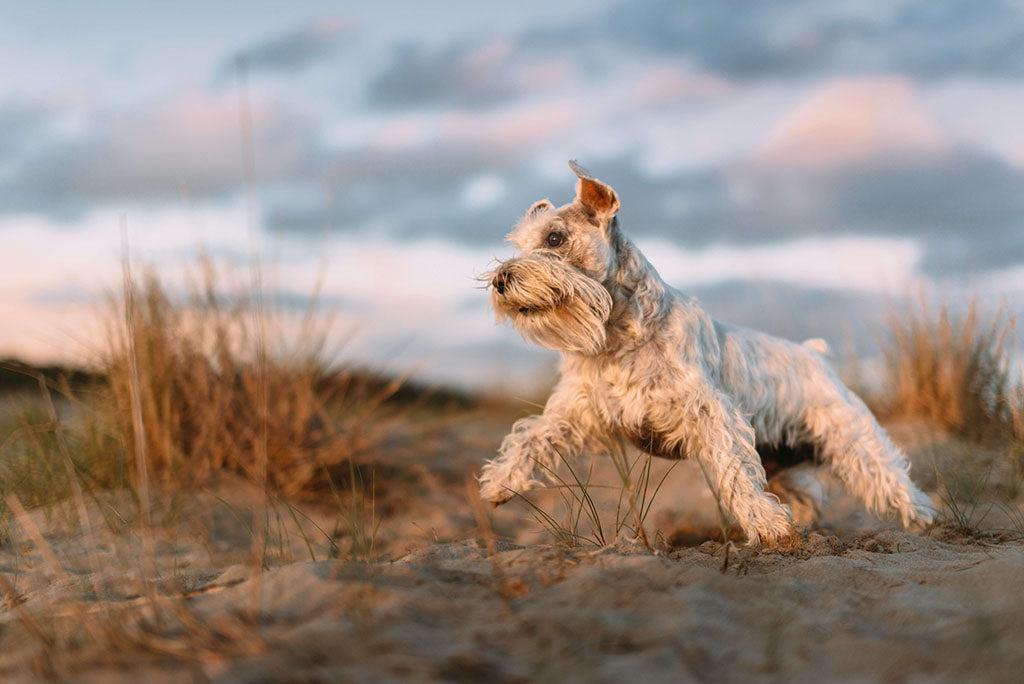Have you ever wondered “do dogs have sweat glands? How do dogs sweat?” Well, in this blog, we’ll learn all about dogs sweating and where they sweat from.
Do Dogs Sweat?

You may have heard the popular theory that dogs don’t sweat. But, is this true? Do dogs sweat?
Well, they in fact do sweat but the function of sweating in dogs isn’t a prominent part of the body’s cooling down process as it is in human beings…
How Do Dogs Sweat?
Dogs have two types of sweat glands – Merocrine and Apocrine glands. The merocrine glands are located in a dog’s paw pads and become active when your dog is hot or stressed. You may notice damp paw prints on the sidewalk on particularly hot days or if they’re very stressed out, but this is most likely a sign that your dog is too hot or wound up and they should be taken home, calmed, and cooled down.
Sweat glands elsewhere on their body wouldn’t be effective – the fur would absorb the sweat, rather than evaporate and it’s the act of evaporation that cools the body down. Your dog’s paws are their least furry area, which is why their sweat glands are there.
A dog’s apocrine glands do secrete sweat, but mainly as a way of emitting their pheromones and unique scent which helps communicate important information about themselves to other dogs. Their purpose is not to cool the body down.
The most effective way that dogs regulate their body temperature is through panting…

When dogs pant, the moisture present in their nasal passages, on their tongue, and within the lung lining evaporates which cools them as air passes over the moist tissue in these areas.
Their blood vessels also expand when they’re hot. This is a mechanism the body uses to bring hot blood closer to the surface of the skin so it can cool before it makes its way back through the body to the heart – a very clever way the body regulates its temperature.
Because they have limited ways of being able to cool down, dogs are very susceptible to heatstroke. You should always make sure your dog has constant, easy access to clean, fresh water at all times and actively try to keep them in the shade and cool on hot days.
You may be tempted to shave your dog’s fur as a way of helping them keep cool, but their fur acts as an insulator. So, fur can in fact help your dog keep cool in warm weather, but warm in cold weather. Taking away this insulating mechanism that is their fur completely, will leave them at a higher risk of heatstroke.
You can read our blog on preventing heatstroke in dogs here. If you suspect your dog is experiencing heat stroke, attempt to cool your dog down and call your vet immediately.
Sources
Author Burke, Anna “Do Dogs Sweat?” American Kennel Club, Apr 25. 2022 https://www.akc.org/expert-advice/health/do-dogs-sweat
Author Pendergrass, JoAnna DVM “How Do Dogs Sweat?” Pet MD, Sep 19. 2018 https://www.petmd.com/news/view/how-do-dogs-sweat-37585
Author Bauhaus, Jean Marie “Do Dogs Sweat? How Your Dog Keeps Their Cool” Hill’s Pet, Feb 14. 2020 https://www.hillspet.com/dog-care/behavior-appearance/do-dogs-sweat
 S
S



